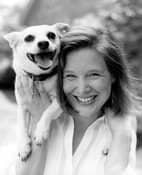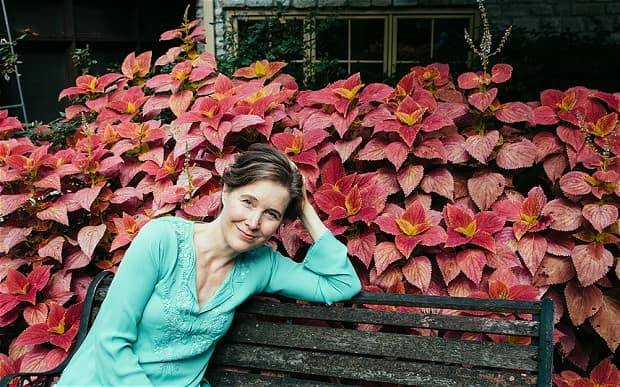 Perhaps a more accurate title for Ann Patchett’s latest book, This Is the Story of a Happy Marriage (HarperCollins, November), would be This Is More Than the Story of a Happy Marriage. A collection of essays on writing, her dog, divorce, and yes, her now happy marriage, the book isn’t really a story at all. The author of six novels including Run, The Patron Saint of Liars, and Taft, and two other works of nonfiction, and one of Time magazine’s 100 Most Influential People in the World in 2012, Patchett has much wisdom to impart, and in this collection she does so with her characteristic honesty, wit, and lyrical writing. Here are four ideas to jumpstart your new year.
Perhaps a more accurate title for Ann Patchett’s latest book, This Is the Story of a Happy Marriage (HarperCollins, November), would be This Is More Than the Story of a Happy Marriage. A collection of essays on writing, her dog, divorce, and yes, her now happy marriage, the book isn’t really a story at all. The author of six novels including Run, The Patron Saint of Liars, and Taft, and two other works of nonfiction, and one of Time magazine’s 100 Most Influential People in the World in 2012, Patchett has much wisdom to impart, and in this collection she does so with her characteristic honesty, wit, and lyrical writing. Here are four ideas to jumpstart your new year.
Buy local!
 Just because the holidays are over, that doesn’t mean we should stop buying books. Patchett, with partner Karen Hays, opened Parnassus Books to fill the void left in Nashville when first the independent and then the big box stores were all forced to close. The decision prompted her inclusion in Time’s list of 100 Most Influential People in 2012 and cast her as a defender for both books and independently owned, local stores. Her essay “The Bookstore Strikes Back” tells the story of how Parnassus came to be and inspires readers to affect similar changes in their own neighborhoods. “Amazon doesn’t get to make all the decisions,” Patchett writes; “the people can make them by how and where they spend their money.” This year, whatever the buying occasion, take a look at your neighborhood, and support the local businesses that you’d like to continue to pass when you walk down your street.
Just because the holidays are over, that doesn’t mean we should stop buying books. Patchett, with partner Karen Hays, opened Parnassus Books to fill the void left in Nashville when first the independent and then the big box stores were all forced to close. The decision prompted her inclusion in Time’s list of 100 Most Influential People in 2012 and cast her as a defender for both books and independently owned, local stores. Her essay “The Bookstore Strikes Back” tells the story of how Parnassus came to be and inspires readers to affect similar changes in their own neighborhoods. “Amazon doesn’t get to make all the decisions,” Patchett writes; “the people can make them by how and where they spend their money.” This year, whatever the buying occasion, take a look at your neighborhood, and support the local businesses that you’d like to continue to pass when you walk down your street.
On second thought, give memories instead of gifts.
Thirty years from now, your kids likely won’t remember the xBox One you wrestled some total stranger to score. Instead, if Patchett’s essay “How to Tell a Christmas Story” is to be believed, they will remember the gifts they never knew they wanted. The essay tells the story of Patchett’s father, from whom she lived apart, calling to read her a Christmas story over the phone. A seemingly simple act became imbued with a kind of magic for young Patchett, partly due to the surprise of it, and partly for the content of the touching story. “There was no gift that made me feel my father really knew me the way that story did.”
Love like a dog.
 We talk about love during the holidays (Valentine’s Day is right around the corner!), but what does it really look like? Patchett learns most about it from her dog, Rose. In “This Dog’s Life,” Patchett observes other dog owners at the dog park, and the ways in which they seem to love their dogs. “I want to learn love people like this,” she writes, “the way I love my dog, with pride and enthusiasm and a complete amnesia for faults. In short, to love others the way my dog loves me.” This essay details the beginning of the love story, but Patchett also tells us about the end, in the essay, “Dog without End,” which details the heartbreaking story of Rose’s death. Here we see this love borne out, as Patchett pushes a stroller carrying Rose—now lame, deaf, and blind—for her final walk around their neighborhood, two days before the dog’s death. Patchett’s final conclusions about how the love she felt for Rose differed from any other she had experienced in her life are a lesson we should all take to heart, year-round.
We talk about love during the holidays (Valentine’s Day is right around the corner!), but what does it really look like? Patchett learns most about it from her dog, Rose. In “This Dog’s Life,” Patchett observes other dog owners at the dog park, and the ways in which they seem to love their dogs. “I want to learn love people like this,” she writes, “the way I love my dog, with pride and enthusiasm and a complete amnesia for faults. In short, to love others the way my dog loves me.” This essay details the beginning of the love story, but Patchett also tells us about the end, in the essay, “Dog without End,” which details the heartbreaking story of Rose’s death. Here we see this love borne out, as Patchett pushes a stroller carrying Rose—now lame, deaf, and blind—for her final walk around their neighborhood, two days before the dog’s death. Patchett’s final conclusions about how the love she felt for Rose differed from any other she had experienced in her life are a lesson we should all take to heart, year-round.
Step outside your comfort zone.
This final lesson is perhaps most applicable to this post-Christmas season, once you’ve survived the gluttony of gifts and food and are looking ahead to a new year, a new you. Patchett’s essay “My Road to Hell Was Paved” lays out a resolution that could be useful to us all. In the essay, Patchett details her assignment to “infiltrate RV culture and expose it for the gas-guzzling, fitness-eschewing underbelly [her] editor knows it to be.” Along the way, something surprising happens: Patchett discovers that she loves the Winnebago, describing the ways in which it has set her free. “I feel like I went out to report on the evils of crack and have come back with a butane torch and a pipe.” We don’t all need to get an RV this year, but we should all look for ways to challenge our assumptions, and to step out of our comfort zones. (Because this is Ann Patchett, the essay is also about how she fell in love again; for that story, the essay is worth reading, even if you’re not looking for lessons or tips on RV vacations.)
The lessons don’t stop here. Patchett’s book contains 22 essays and while they have almost all appeared in other publications between 1996 and 2012, the sum here is greater than the parts. The experience of reading the collection is very different than stumbling upon just one of them in a magazine. Taken together they suggest an outlook on and approach to life that we can all learn something from, especially as a new year begins.



